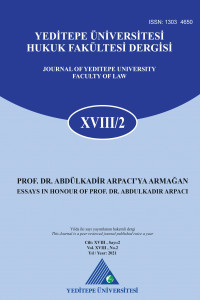Abstract
One of the great law scholars of the Classical Period of Roman Law, whose fragmentums are quoted in Digesta of Justinianus is Celsus. It should be noted that Celsus is also famous for introducing the principle of “impossibilium nulla obligatio est” in legal history. In the fragmentum which is the subject of this article, Celsus gives an interesting example case concerning the concept of unjustifiable enrichment. In this case, there is an indirect enrichment. The interpretation of this case according to today’s legal system gives rise the problem of who can put forward the request for return based on indirect enrichments. At this point different results may arise depending on whether the transfer of movable ownership is abstract for the reason (causa) or not. Another question is whether a special right for litigation based on the rule of honesty is possible instead of a request based unjustifiable enrichment.
References
- BURCUOĞLU.H., Taşınır Mülkiyeti Devrinde Sebebe Bağlılık ve Soyutluk Kavramları ve Bu Kavramlar Kapsamında Sebepsiz Zenginleşme, İstanbul Aydın Üniversitesi, Hukuk Fakültesi Dergisi, Yıl4, Sayı 1, Haziran 2018, s.57 – 82
- FEENSTRA, R., Die ungerechtfertigte Bereicherung in Dogmengeschichtlicher Sicht, “dergiler.ankara.edu.tr”, s. 289 vd.
- OĞUZMAN/ÖZ., Borçlar Hukuku Genel Hükümler, Cilt 2, 16.Bası, İstanbul 2021
- OĞUZMAN/BARLAS, Medeni Hukuk, Giriş, Kaynaklar, Temel Kavramlar, 25.Bası, İstanbul 2019, parag: 926 vd.
- ÖZ,T., Öğreti ve Uygulamada sebepsiz Zenginleşme, İstanbul 1990.
- ÖZ,T., Sebepsiz Zenginleşmeden Doğan Borç İlişkileri, Borçlar Kanunu Genel Hükümler Konferansları, Prof. Dr. İsmet Sungurbey’e armağan, Cilt III, İstanbul Barosu yayınları, İstanbul 2014
- ÖZ,T. BK 65 Kuralının Sınırlandırılması Sorunu ve BK m.20 Kuralı ile İlişkisi,, Rüşvet – Başlık Parası, İstanbul Barosu Dergisi 1985, S.1-2-3, s. 105 vd.
- ÖZ,T., İsviçre federal mahkemesinin 27 Şubat 1989 Tarihli Kararının Düşündürdükleri, MHAD 1990, No 18, s.105 vd.
- ÖZ,T., Borçlu Temerrüdünde Sözleşmeden Dönmenin Bu Sözleşme Gereğince kazanılmış ayni Haklara Etkisi ve Klasik Dönme Kuramı ile Yeni Dönme Kuramının Kısa Bir Karşılaştırmalı Eleştirisi, MHAD 1985, S.16, s.131 vd.
- ÖZ,T., Prof.Dr. David Pugsley, Justinianus’un İstanbul Hukuk Okulu Açılış Konuşması, İstanbul 2019 s. 8 vd.
- ÖZ,T., Banka Havalelerinde Sebepsiz Zenginleşme, Kadir Has Üniversitesi Hukuk Fakültesi Dergisi, Cilt V, Sayı 1, Haziran 2017, Prof. Dr. Mustafa Dural Anısına Özel sayı, s.139 – 148
- SEROZAN, R., İfa, İfa Engelleri, 6.Bası, İstanbul 2014
- The Code of Justinian, “hhtps://droitromain.univ-grenoble-alp.fr/Anglica/ codjust_Scot.htm
- ULUSAN,İ., İyiniyetli Sebepsiz Zenginleşenin İade Borcunun Sınırlanması Sorunu, İstanbul 1984.
Abstract
Justinianus’un Digesta’sında fragmentumları alıntılanan klasik dönemin büyük hukukçularından biri de Celsus’tur. Celsus hukuk tarihinde “impossibilium nulla obligatio est” ilkesini ortaya atan kişidir. Bu makaleye konu fragmentumda Celsus, sebepsiz zenginleşme kurumunu ilgilendiren ilginç bir olay örneği veriyor. Verdiği örnekte dolaylı bir sebepsiz zenginleşme söz konusudur. Bu örneğin günümüz hukuk sistemine göre yorumlanması, sebepsiz zenginleşmeye dayanan iade talebinin dolaylı zenginleşmelerde kimin tarafından ileri sürülebileceği sorununu su yüzüne çıkarır. Bu noktada ise, taşınır mülkiyeti naklinin sebebe bağlı mı sebepten soyut mu olduğuna göre farklı sonuçlar doğabilir. Bir diğer soru da örnekteki dolaylı zenginleşmede sebepsiz zenginleşme yerine dürüstlük kuralına dayanan özel bir davanın mümkün olup olmadığıdır.
References
- BURCUOĞLU.H., Taşınır Mülkiyeti Devrinde Sebebe Bağlılık ve Soyutluk Kavramları ve Bu Kavramlar Kapsamında Sebepsiz Zenginleşme, İstanbul Aydın Üniversitesi, Hukuk Fakültesi Dergisi, Yıl4, Sayı 1, Haziran 2018, s.57 – 82
- FEENSTRA, R., Die ungerechtfertigte Bereicherung in Dogmengeschichtlicher Sicht, “dergiler.ankara.edu.tr”, s. 289 vd.
- OĞUZMAN/ÖZ., Borçlar Hukuku Genel Hükümler, Cilt 2, 16.Bası, İstanbul 2021
- OĞUZMAN/BARLAS, Medeni Hukuk, Giriş, Kaynaklar, Temel Kavramlar, 25.Bası, İstanbul 2019, parag: 926 vd.
- ÖZ,T., Öğreti ve Uygulamada sebepsiz Zenginleşme, İstanbul 1990.
- ÖZ,T., Sebepsiz Zenginleşmeden Doğan Borç İlişkileri, Borçlar Kanunu Genel Hükümler Konferansları, Prof. Dr. İsmet Sungurbey’e armağan, Cilt III, İstanbul Barosu yayınları, İstanbul 2014
- ÖZ,T. BK 65 Kuralının Sınırlandırılması Sorunu ve BK m.20 Kuralı ile İlişkisi,, Rüşvet – Başlık Parası, İstanbul Barosu Dergisi 1985, S.1-2-3, s. 105 vd.
- ÖZ,T., İsviçre federal mahkemesinin 27 Şubat 1989 Tarihli Kararının Düşündürdükleri, MHAD 1990, No 18, s.105 vd.
- ÖZ,T., Borçlu Temerrüdünde Sözleşmeden Dönmenin Bu Sözleşme Gereğince kazanılmış ayni Haklara Etkisi ve Klasik Dönme Kuramı ile Yeni Dönme Kuramının Kısa Bir Karşılaştırmalı Eleştirisi, MHAD 1985, S.16, s.131 vd.
- ÖZ,T., Prof.Dr. David Pugsley, Justinianus’un İstanbul Hukuk Okulu Açılış Konuşması, İstanbul 2019 s. 8 vd.
- ÖZ,T., Banka Havalelerinde Sebepsiz Zenginleşme, Kadir Has Üniversitesi Hukuk Fakültesi Dergisi, Cilt V, Sayı 1, Haziran 2017, Prof. Dr. Mustafa Dural Anısına Özel sayı, s.139 – 148
- SEROZAN, R., İfa, İfa Engelleri, 6.Bası, İstanbul 2014
- The Code of Justinian, “hhtps://droitromain.univ-grenoble-alp.fr/Anglica/ codjust_Scot.htm
- ULUSAN,İ., İyiniyetli Sebepsiz Zenginleşenin İade Borcunun Sınırlanması Sorunu, İstanbul 1984.
Details
| Primary Language | Turkish |
|---|---|
| Subjects | Law in Context |
| Journal Section | Research Articles |
| Authors | |
| Publication Date | October 15, 2021 |
| Submission Date | May 23, 2021 |
| Published in Issue | Year 2021 Volume: 18 Issue: 2 |


